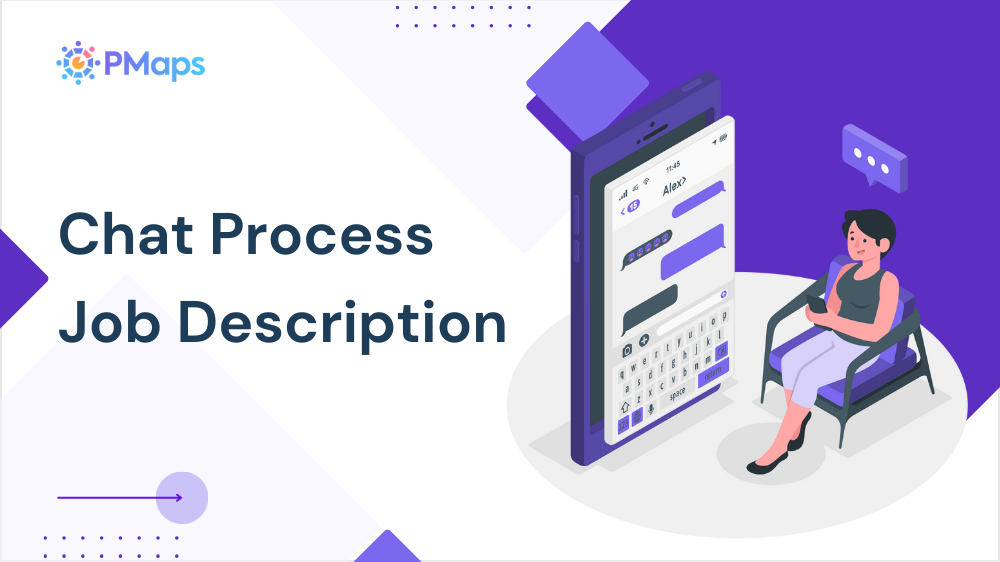
Chat support has become the frontline of customer experience in digital-first businesses. Whether it's e-commerce, SaaS, telecom, or BFSI, skilled chat support agents play a critical role in resolving issues, calming frustrated users, and maintaining brand loyalty — all without ever picking up the phone.
For recruiters and hiring managers, evaluating chat support candidates isn't just about typing speed or grammar. It's about screening for composure under pressure, written communication acuity, tech familiarity, and customer-centric thinking.
This guide covers the most relevant chat process interview questions across general, behavioral, situational, and technical categories — enabling structured evaluations and better hiring decisions.
Need calm communicators? Use the Chat Support Test to screen faster.
General Interview Questions for Chat Support Roles
Before testing performance under pressure, begin by gauging general awareness, communication style, and role motivation. These questions help establish whether a candidate understands the demands of chat-based customer service and can meet basic expectations. Each response offers insight into their fit for customer-facing roles.
1. How do you handle multiple chat conversations simultaneously?
What it assesses:
Time management, multitasking, and focus under pressure.
What to look for:
Candidates should mention use of templates, chat macros, prioritization tactics, and how they prevent errors during parallel interactions. Strong responses show composure and structure — not panic.
Sample Answer:
“I usually handle 3–5 chats at once. I rely on shortcuts and predefined responses for common issues, allowing me to respond quickly. For complex queries, I flag and focus attention accordingly. I also track each conversation thread carefully using tags or internal notes.”
2. Why do you want to work in a chat support role?
What it assesses:
Job motivation, interest in customer service, and written communication preferences.
What to look for:
Genuine interest in written support, enjoyment in helping people, and awareness of what chat support entails — like speed and clarity over the phone.
Sample Answer:
“I’ve always preferred written communication and enjoy resolving problems quickly. I like that chat allows for real-time support while giving me time to think and frame accurate responses. I also find satisfaction in multitasking while helping multiple customers at once.”
3. Describe your typing speed and accuracy.
What it assesses:
Typing proficiency and operational readiness.
What to look for:
A good candidate will mention specific WPM and accuracy stats, along with tools used to measure and improve their typing skills.
Sample Answer:
“My typing speed is around 68 words per minute with over 95% accuracy. I regularly test myself using tools like TypingTest or Keybr to stay sharp. I’ve also trained myself to maintain tone and clarity even at high speed.”
4. How would you respond to an angry customer over chat?
What it assesses:
Emotional control, conflict resolution, and empathy in written form.
What to look for:
They should show the ability to remain calm, avoid escalation, and use respectful language — even under pressure. Look for phrases like "I understand" or “Let’s work this out.”
Sample Answer:
“I’d begin by acknowledging their frustration and apologizing for the inconvenience. I’d avoid defensive language and shift the conversation toward resolution. For example: ‘I completely understand your concern, and I’m here to help get this resolved for you right away.’”
5. What’s the difference between email support and chat support?
What it assesses:
Understanding of support channels and communication dynamics.
What to look for:
Clear explanation that chat is real-time and expects faster, concise responses, while email is more formal and slower-paced. Bonus if they mention multitasking or wait-time handling.
Sample Answer:
“Chat support is immediate, requiring quick, short responses while managing multiple customers at once. Email allows for more detailed explanations but has longer resolution times. Chat agents must balance speed with empathy — something I’ve trained myself to do consistently.”
Behavioral Interview Questions
Behavioral questions help uncover how candidates have handled real situations in past roles. Using the STAR method (Situation, Task, Action, Result), recruiters can evaluate emotional resilience, customer handling skills, and accountability under real-world stress.
6. Tell me about a time you dealt with a difficult customer.
What it assesses:
Conflict resolution, patience, and emotional maturity.
What to look for:
Look for signs of empathy, calm language, timely updates, and an effort to de-escalate. A good response includes how the issue was resolved and any positive customer feedback received.
Sample Answer:
S: A customer was furious about being charged twice.
T: I needed to calm them down and resolve the issue fast.
A: I validated their frustration, checked the logs, and reversed the duplicate charge while updating them every few minutes.
R: The refund was processed, and the customer later gave positive feedback.
7. Describe a time you made a mistake in a chat conversation.
What it assesses:
Accountability, honesty, and how they recover from errors.
What to look for:
Candidates who admit their mistake clearly, explain how they fixed it, and describe how they prevented recurrence show strong professionalism and coachability.
Sample Answer:
S: I gave incorrect refund info to a customer.
T: I had to correct the error and maintain trust.
A: I acknowledged the mistake, apologized, corrected the information, and updated the internal help guide for clarity.
R: The customer appreciated my honesty and the issue was resolved without escalation.
8. Give an example of when you went above and beyond in customer service.
What it assesses:
Initiative, customer-first attitude, and ownership.
What to look for:
Strong responses show willingness to stretch beyond regular duties to help a customer. Ideally, the situation had a business or emotional impact on the customer.
Sample Answer:
S: A customer was unable to access their subscription and had an urgent project deadline.
T: I had to get them access within 10 minutes.
A: I coordinated with IT support via internal chat while staying connected to the customer. I also sent manual login details.
R: They accessed their files in time and sent a personal thank-you email.
9. Describe a time you had to learn a new tool quickly.
What it assesses:
Adaptability, self-learning ability, and digital agility.
What to look for:
Candidates should show how they approached the learning curve efficiently — through tutorials, trial runs, or internal documentation.
Sample Answer:
S: We switched to a new CRM right before the peak support season.
T: I had two days to get up to speed.
A: I followed the onboarding videos, practiced with sandbox tickets, and noted key workflows.
R: I was able to handle chats independently within 48 hours and helped a teammate troubleshoot issues too.
10. Have you ever received feedback that improved your performance?
What it assesses:
Coachability, self-awareness, and commitment to growth.
What to look for:
They should highlight a specific piece of constructive feedback, how they implemented it, and the resulting improvement.
Sample Answer:
S: My manager noticed I was too formal in chats.
T: I had to adapt to a more friendly brand tone.
A: I reviewed our tone guide, created new templates, and ran them by the QA team.
R: My CSAT scores improved, and I received recognition during our team meeting.
Situational Interview Questions
Situational questions explore how a candidate would react to hypothetical but realistic scenarios. These help assess problem-solving skills, adherence to process, and the ability to think clearly during fast-moving or unfamiliar situations.
11. A customer keeps asking the same question. How do you handle it?
What it assesses:
Patience, clarity in communication, and adaptability.
What to look for:
Ideal responses involve reframing answers, checking for confusion on the agent’s side, and offering alternate formats (e.g., screenshots, help links).
Sample Answer:
“I’d simplify my explanation, offer step-by-step instructions, and ask follow-up questions to confirm their understanding. If the issue continues, I’d offer a visual guide or suggest transferring to another agent for a second opinion.”
12. You're handling three chats, and one turns technical beyond your scope. What do you do?
What it assesses:
Prioritization, communication, and teamwork.
What to look for:
Candidates should demonstrate proactive escalation, transparency with the customer, and an ability to manage the remaining chats without disruption.
Sample Answer:
“I’d inform the customer that I’m escalating their case and provide an ETA. I’d then loop in the right team while continuing my other chats. Once resolved, I’d update the customer personally with a resolution.”
13. A customer asks for information you’re not allowed to share. How do you respond?
What it assesses:
Policy adherence, professionalism, and boundary-setting.
What to look for:
Look for polite refusals with clear reasons and alternatives. Responses must reflect trust-building language while following compliance rules.
Sample Answer:
“I’d politely state that I’m unable to share that information due to company policy, and redirect them to a supervisor or the relevant team. I’d use language like: ‘I’m really sorry, but that information is protected. Let me guide you to someone who can assist further.’”
14. Your shift ends mid-conversation. What’s your next step?
What it assesses:
Responsibility, transition handling, and customer experience focus.
What to look for:
Good candidates ensure no abrupt chat drops and leave clear handover notes. Look for accountability and customer-first thinking.
Sample Answer:
“I’d politely inform the customer that I’m handing over to another agent and summarize the chat in internal notes. If the conversation is sensitive, I’d consider extending my shift by a few minutes to finish it myself.”
Technical or Role-Specific Questions
Technical questions verify whether candidates can practically function in the chat environment. This includes familiarity with tools, ticket systems, productivity metrics, and live support etiquette. A strong candidate should answer these with confidence and clarity.
15. Which tools have you used for live chat support?
What it assesses:
Tool proficiency and comfort with real-time communication systems.
What to look for:
Look for platform names like Zendesk, Freshchat, Intercom, or LiveAgent, plus specific features they used (tags, macros, ticketing, escalation).
Sample Answer:
“I’ve used Zendesk and Intercom. I’m comfortable using macros, tags, CRM integrations, and resolving tickets live. I’ve also handled proactive chats triggered by user behavior on-site.”
16. How do you ensure grammatical accuracy under pressure?
What it assesses:
Attention to detail, self-monitoring, and tool usage.
What to look for:
Mention of Grammarly, browser extensions, and a habit of re-reading messages. They should emphasize quality without losing speed.
Sample Answer:
“I use Grammarly for real-time checks and have created my own quick-check routine. I also reread each message before sending, especially if I’m juggling multiple chats.”
17. What KPIs do you track in chat support?
What it assesses:
Performance awareness and goal orientation.
What to look for:
Look for KPIs like FRT (First Response Time), AHT (Average Handle Time), CSAT (Customer Satisfaction Score), Resolution Rate, and Chat Abandonment Rate.
Sample Answer:
“I track FRT to ensure I respond fast, and CSAT to measure customer happiness. I also monitor AHT for efficiency and Resolution Rate to avoid repeat chats. These KPIs help me stay balanced between speed and satisfaction.”
18. How do you prioritize chats during peak hours?
What it assesses:
Decision-making and pattern recognition under pressure.
What to look for:
Candidates should describe scanning for urgency keywords, using filters, and toggling between chats without compromising on tone or accuracy.
Sample Answer:
“I first scan incoming chats for urgency — terms like ‘payment failed’ or ‘order stuck’ get top priority. I use pre-written replies for common queries and allocate more time to escalations.”
19. Have you worked with chatbot-assisted workflows?
What it assesses:
Understanding of automation in chat workflows.
What to look for:
They should show where the bot ends and human interaction begins, and how they manage bot handovers or suggest bot improvements.
Sample Answer:
“Yes, I’ve worked with AI chatbots that handle FAQs and hand over complex issues. I monitor live chats and step in when the bot flags for human support. I also suggest updates to the bot based on repeated customer confusion.”
20. What’s your process for documenting issues after a chat?
What it assesses:
Documentation habits, accountability, and workflow discipline.
What to look for:
Strong responses include tagging, summary writing, follow-ups, and using resolution codes. They should understand how documentation affects future support quality.
Sample Answer:
“I tag the issue type, write a short summary in internal notes, and flag for follow-up if unresolved. For repeat issues, I add a pattern note so it’s easier for the next agent or QA team to track.”
Curious about scope? Revisit the Chat Support Job Description before moving ahead.
Pro Tips for Interviewing Chat Support Candidates
Beyond structured questions, effective chat support hiring relies on real-time evaluations, micro-observations, and task-based testing. These tips can help recruiters uncover capabilities that traditional Q&A often miss — such as multitasking, tone control, and issue ownership.
1. Run a timed chat simulation
Observe how the candidate responds to two or more simultaneous customer queries. This reveals their ability to prioritize, stay composed, and write with clarity under time pressure.
2. Include a tone test
Give them a scenario involving an angry or sarcastic customer. Ask for a live chat reply. Assess whether the tone is empathetic, neutral, and non-confrontational while still addressing the issue.
3. Evaluate tool familiarity practically
Don’t just ask — show. Share a mock dashboard or CRM screenshot and ask them to identify what they’d click first or how they’d retrieve past interaction history.
4. Ask them to correct a poorly written message
This shows grammar proficiency, tone judgment, and brand alignment. It’s also useful for gauging how much “polishing” a candidate naturally does.
5. Use a pre-hire assessment
Standardize your hiring with a chat support test tailored for response quality, typing speed, grammar, and situational judgment. It helps filter high-performing candidates faster.
Conclusion
Hiring the right chat support agent means identifying more than just speed — it’s about clarity, calmness, and customer focus. Use these questions and insights to structure effective interviews and spot candidates who won’t just respond quickly, but respond right.Want to make chat support hiring faster and sharper? Use our chat support test or reach out at 8591320212 / assessment@pmaps.in









